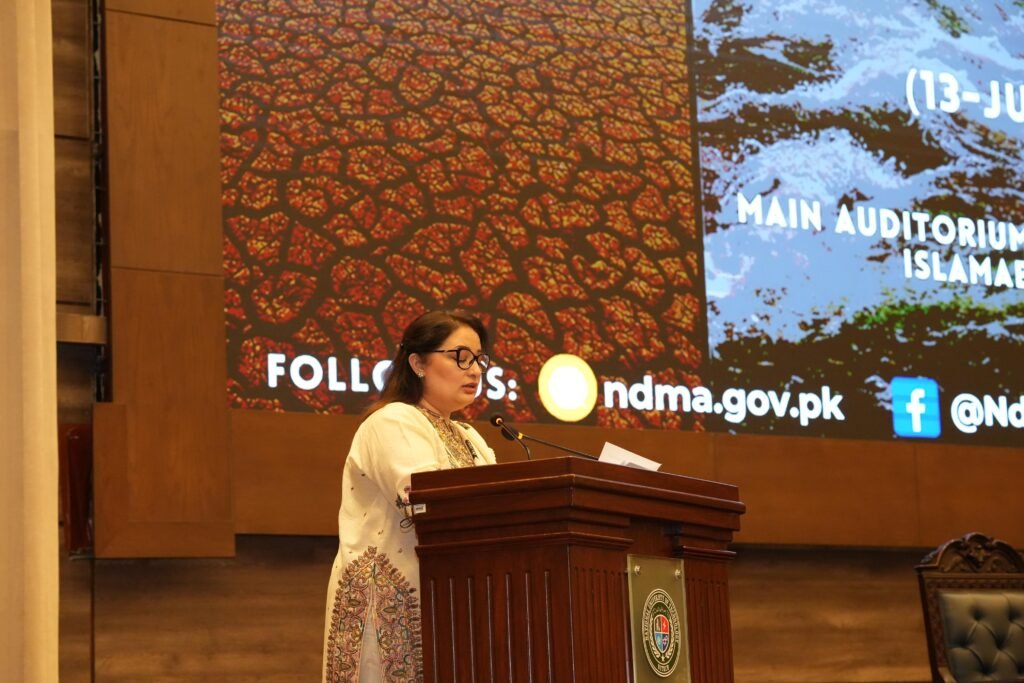Islamabad: Prime Minister’s Coordinator on Climate Change MNA Romina Khurshid Alam said on Thursday that as Pakistan struggles to combat the effects of climate change, summer heat waves and floods, the government is now looking at a comprehensive policy to tackle the problem. The impact resulted in irreparable economic losses at the cost of billions of rupees.
Addressing a national seminar on ‘Pakistan Against Natural Disasters’ organized by the National Disaster Management Authority here at the National University of Technology, the Deputy Prime Minister said that frequent disturbances in normal weather conditions in the past decade have significantly affected the country’s agricultural productivity, he said he was impressed. threatening our nation’s food water, energy supply, food for millions, hunger and malnutrition.
He said the country’s geographical location, and its socio-economic vulnerability, exacerbated the risks posed by the climate crisis.
Evidence from various reports of international financial institutions such as the World Bank and the Asian Development Bank show that the country will continue to experience more severe effects of climate change in the future, including more irregular weather patterns, increased melting of ice sheets, rising seas. level and more exposure. These impacts not only threaten human lives and infrastructure, but also exacerbate existing socioeconomic inequalities, the report said.

Citing the World Bank study, Pakistan: Climate and Development Report, PM Assistant Romina Khurshid estimated economic losses from weather and weather-related disasters in Pakistan to be $29.3 billion between 1992 and 2021. Agriculture and commodities accounted for 11.1% of GDP in 2020.
Devastating floods in 2022 alone will cause losses and economic damage of more than $30 billion, highlighting the urgent need for comprehensive measures.
Romina Khurshid Alam told the participants about the climate risk mitigation measures of the current government of Prime Minister Shehbaz Sharif, “The current government under Prime Minister Shehbaz Sharif took global policy initiatives and took several adaptation and mitigation measures to overcome these measures. deterioration of the country’s climate vulnerability.”
Coordinator Prime Minister Romina Khurshid said that as part of climate change adaptation and mitigation policy measures, strengthening investment in sustainable infrastructure, sustainable agricultural practices, efficient water management and renewable energy is necessary to build resilience against the risks of climate change and protect our country’s defense. vulnerable socio-economic sectors and the lives and livelihoods of climate-vulnerable communities, especially in coastal and mountainous areas.
Governments have now made climate action a priority to protect people’s lives and livelihoods and ensure a sustainable future for future generations.
Mentioning various policy initiatives, the Deputy Prime Minister said that the Ministry of Climate Change and Environmental Coordination implements strong policies and implementation frameworks such as National Policy Policy, National Policy and Implementation Framework to address climate and environmental challenges. Climate Change Policy, National Forest Policy, Pakistan Climate Change Act (2017), Green Building Code.
In addition, various policies have been implemented such as this policy and Glacial Lake Outfall Flood (GLOF) Risk Reduction Project, Living Indus Initiative, Replenish Pakistan and Green Pakistan Program. According to Romina Khurshid, saplings are planted all over the country.
He also told the seminar participants that Pakistan’s National Adaptation Plan was implemented by the ministry in consultation with provincial, national and international stakeholders to increase resilience, address vulnerability and mobilize climate finance, manage disaster risk through investment. early warning system, improved weather management and preparedness for effective response.
Arranging adequate funds to implement various policies and implementation frameworks to combat the impact of climate change in the socio-economic sector is a major challenge, said the Deputy Prime Minister, urging the private sector to support and finance the government’s climate resilience initiatives. he called.
There are efforts to attract financial institutions, including the banking sector, industry and corporations, to invest in the government’s climate sustainable development programs and projects in public-private partnerships, and to attract the private sector to help strengthen the government’s work.





















